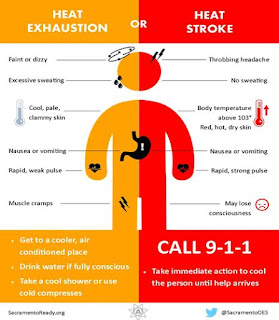Recognize and Prevent Heat Exhaustion/Stroke with These Tips
Summer is upon us all again. As we all have just experienced the summer solstice and the beginning of summer’s heat, a few tips and warning signs to keep in mind when out in the sun.
From the Centers of Disease Control and Prevention (CDC), when the body suffers from extreme heat, damage may occur to the brain or other vital organs. Individuals who are more susceptible to heat are the elderly, youth (0-4 years old), those who are overweight, those who have a fever, those who are dehydrated, those who have heart disease, those who have mental illness, those who have poor circulation, those who have sunburn, and those who use prescription drugs or alcohol.
Illnesses that are related to heat are the following:
Heatstroke: a life-threatening illness in which body temperature may rise above 106° F in minutes; symptoms include dry skin; rapid, strong pulse; and dizziness.
Heat exhaustion: an illness that can precede heatstroke; symptoms include heavy sweating, rapid breathing, and a fast, weak pulse.
Heat cramps: muscle pains or spasms that happen during heavy exercise.
Heat rash: skin irritation from excessive sweating.
What you should do when these happen:
If you exhibit the following symptoms:
You are exhibiting the signs of heat exhaustion.
Then you should do the following:
- Move to a cooler location
- Lie down and loosen your clothing
- Apply cool, wet cloths to as much of your body as possible
- Sip water
If you exhibit the following symptoms:
- High body temperature (above 103° F)*
- 104° F taken rectally is the most accurate.
- Hot, red, dry or moist skin
- Rapid and strong pulse
- Possible unconsciousness
Then you should do the following:
- Call 911 immediately – THIS IS A MEDICAL EMERGENCY.
- Move the person to a cooler environment
- Reduce the person’s body temperature with cool cloths or even a bath
- Do NOT give fluids
Hopefully, none of us will experience these illnesses, but if you do, you know what to do now.
For more information on medically-related information, please consult Birmingham Public Library’s health-related databases at http://www.bplonline.org/virtual/databases/default.aspx?p=2&q=13#db or visit your local branch.
Samuel Rumore
Springville Road Regional Branch Library


Comments